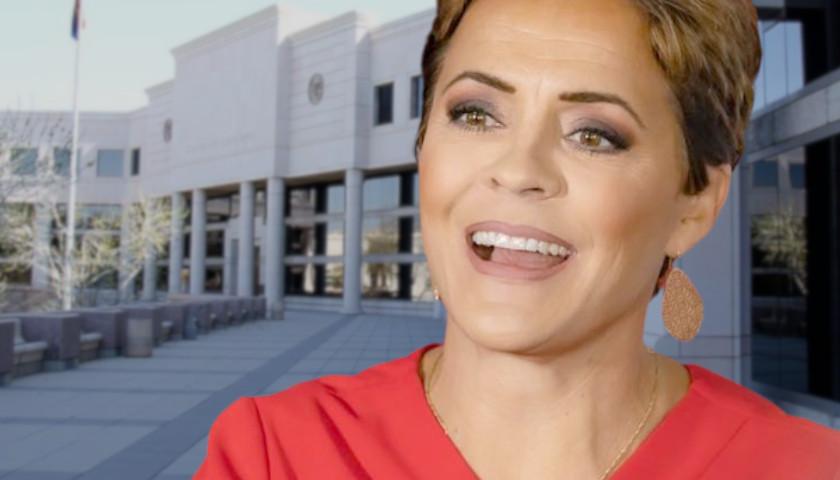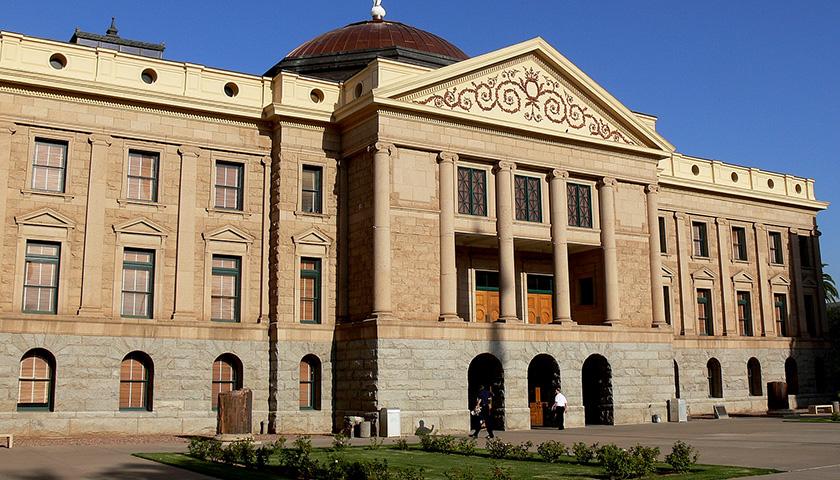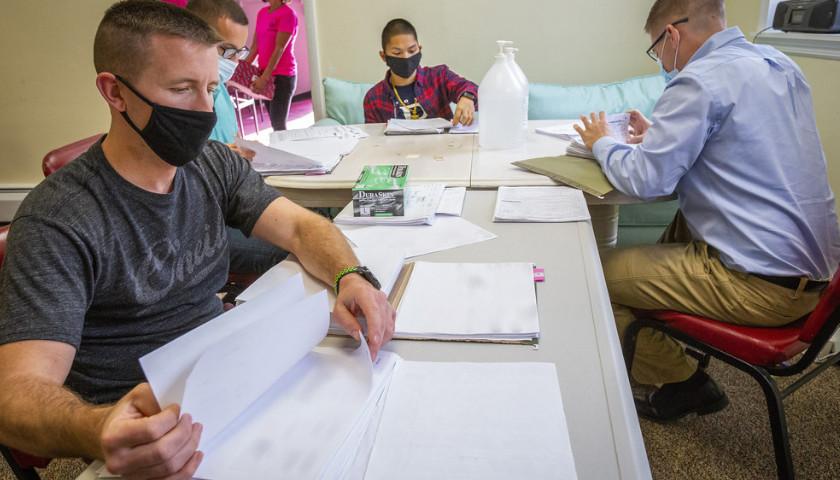After deliberating on whether to accept Kari Lake’s appeal of the dismissal of her election challenge in Arizona’s gubernatorial race, the Arizona Supreme Court issued an order on Wednesday that remanded the part of the case regarding Maricopa County’s signature verification process back to the trial court judge, and dismissed the other parts.
Lake issued a statement after the ruling. “I am thrilled that the Supreme Court has agreed to give our signature verification evidence the appropriate forum for the evaluation it deserves.” She said, “The violation of procedure allowed for tens of thousands of illegal ballots to be approved and counted. Aside from all other issues, including nearly 60% of polling locations being inoperable on Election Day, this issue alone casts the veracity of Katie Hobbs’ victory in serious doubt.”
Lake noted, “Immediately following the election, multiple Maricopa County Elections Department officials — individuals who were involved in the signature verification process — reached out to me and urged my team to review the signatures.”
She concluded, “Three whistleblowers came forward with revelations of massive failures in the signature verification process. These whistleblowers were intimately involved in the process and they allege that Maricopa County WILLFULLY ignored law and procedure.”
During an interview with Newsmax, Lake said, “I am seriously thinking about taking this to the U.S. Supreme Court. I think they’re ready to take an election case.”
In its order, the Arizona Supreme Court declined review of “issues one through five and seven,” which Lake laid out in her petition for review, stating that “The Court of Appeals aptly resolved these issues.”
However, the court questioned the lower courts’ dismissal of Lake’s signature verification claim due to laches. The lower courts asserted that she did not bring the claim in a timely manner, ruling that challenging Maricopa County’s signature verification process should have taken place prior to the election. The doctrine of laches refers to a claim that is not brought in a proper or reasonable amount of time. It was used to dismiss many of the election contests alleging fraud in the 2020 presidential election.
The court quoted Lake’s accusation, “Upon information and belief, a material number of early ballots cast in the November 8, 2022 general election were transmitted in envelopes containing an affidavit signature that the Maricopa County Recorder or his designee determined did not match the signature in the putative voter’s ‘registration record.’ The Maricopa County Recorder nevertheless accepted a material number of these early ballots for processing and tabulation.”
The decision explained, “Contrary to the ruling of the trial court and the Court of Appeals Opinion, this signature verification challenge is to the application of the policies, not to the policies themselves.” The justices concluded, “Therefore, it was erroneous to dismiss this claim under the doctrine of laches because Lake could not have brought this challenge before the election.”
Ryan Heath of The Gavel Project, who filed an amicus curiae brief supporting Lake in his personal capacity, addressed the doctrine of laches issue extensively in his brief. Heath stated that Lake had no way of knowing before the election that these violations were occurring, and they weren’t procedural violations. “[H]er objections regarding verification were never objections to Maricopa’s existing election procedures but, rather, objections to the fact that votes were illegally counted,” he argued. He cited case law which distinguished the doctrine of laches from barring claims about “alleged acts of misconduct that occurred prior to an election” versus “acts of alleged misconduct that occurred during the ‘voting process.’”
Under Attorney General Mark Brnovich, the Arizona Attorney General Office’s Election Integrity Unit civil attorney Jennifer Wright attempted to investigate Maricopa County’s signature verification process, but was unable to get compliance from county officials. She sent them four letters requesting information that were blown off or answered with minimal information.
Wright requested “copies of the voter registration records of 51 individuals whose ballot affidavit signatures did not appear to match signatures on publicly recorded, notarized documents.” However, Wright stated in her fourth letter, “Although Maricopa provided one or two exemplars for all 51 people identified, Maricopa did not provide all of the information requested.” She said the county agreed that some of the signatures appeared not to match, but never followed up with her about them.
Shelby Busch, who heads the election integrity group We the People AZ, testified to the Arizona Senate Election Committee in January about hundreds of thousands of signatures that did not match but the ballots were accepted anyway by Maricopa County. She said 47,366 failed to meet the basic Arizona Secretary of State standards, and 1,870 ballots were illegally cured. Dr. Walter Daugherity, a math professor at Texas A&M University, testified that he was 99.999 percent confident that there were 290,644 bad signatures accepted in the election.
The Arizona Supreme Court ordered several lines of the appeals court opinion vacated, and remanded part of Lake’s appeal “to determine whether the claim that Maricopa County failed to comply with A.R.S. § 16-550(A) fails to state a claim pursuant to Ariz. R. Civ. P. 12(b)(6) for reasons other than laches, or, whether Petitioner can prove her claim as alleged pursuant to A.R.S. § 16-672 and establish that ‘votes [were] affected ‘in sufficient numbers to alter the outcome of the election’ based on a ‘competent mathematical basis to conclude that the outcome would plausibly have been different, not simply an untethered assertion of uncertainty.’”
By using the word “uncertainty,” the court indicated that it was following the precedent established in Arizona case law for election challenges, that it is only necessary to show it is uncertain that a number of affected votes could have affected the outcome. The trial court judge, Maricopa County Superior Court Judge Peter Thompson, required an high standard for Lake to prevail, including showing “intentional” behavior by an official. The Arizona Court of Appeals, although it upheld Thompson’s dismissal of Lake’s case, rejected that standard in February.
That court said in its opinion, “Lake contends that the superior court erred by defining ‘misconduct’ under § 16-672(A)(1)as requiring proof that an elections official intended to improperly affect the result. We agree that there may be circumstances under which something less than intentional misconduct may suffice. Cf. Findley, 35 Ariz. at 269 (explaining that ‘honest mistakes or mere omissions’ are insufficient to invalidate an election ‘unless they affect the result, or at least render it uncertain’).”
The Arizona Supreme Court concluded its decision by stating that Lake could file a response to the motion for sanctions that addresses her claim that “35,563 unaccounted for ballots were added to the total of ballots at a third party processing facility.” The justices said, “The record does not reflect that 35,563 unaccounted ballots were added to the total count.”
Although the court said the record doesn’t show the extraneous ballots, Lake argued in a reply that Hobbs’ own response acknowledged the discrepancy. “In her reply brief below, Lake showed that the number of ballots Runbeck received on Election Day and recorded on the MC Inbound — Receipt of Delivery forms cited by Hobbs, including all EDDB ballots received from MCTEC, totaled 263,379 ballots. Id. In her answering brief below, Hobbs also included a defense trial exhibit, MC Incoming Scan Receipt forms, which showed that Runbeck scanned a total of 298,942 ballots on Election Day — an unaccounted for discrepancy of 35,563 ballots. Id. (addressing Hobbs’ answering brief).”
– – –
Rachel Alexander is a reporter at The Arizona Sun Times and The Star News Network. Follow Rachel on Twitter. Email tips to [email protected].
Photo “Kari Lake’ by Kari Lake. Background Photo “Arizona Supreme Court” by davidpinter. CC BY 3.0.





